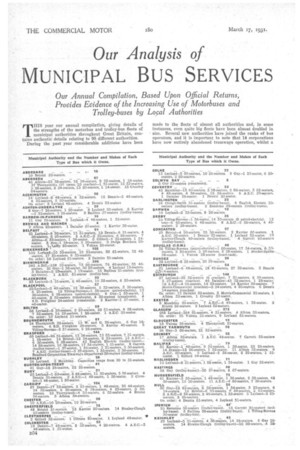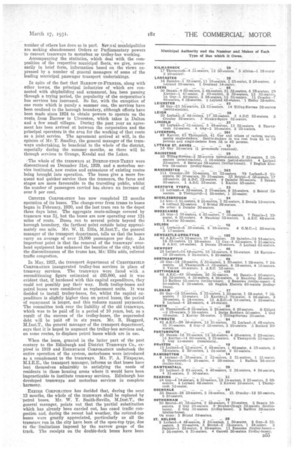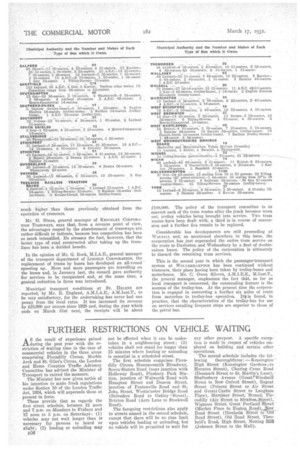Our Analysis of
Page 124

Page 125

Page 126

If you've noticed an error in this article please click here to report it so we can fix it.
MUNICIPAL BUS SERVICES
Our Annual Compilation, Based Upon Official Returns, Provides Evidence of the Increasing Use of Motorbuses and Trolley-buses by Local Authorities
Tills year our annual compilation, giving details of the strengths of the motorbus and trolley-bus fleets of municipal authorities throughout Great Britain, contains authentic details relating to 98 different authorities. During the past year considerable additions have been made to the fleets of almost all authorities and, in some instances, even quite big fleets have been almost doubled in size. Several new authorities have joined the ranks of bus operators, and it is important to note that 14 corporations have now entirely abandoned tramways operation, whilst a number of others has done so in part. Nov nal municipalities are seeking abandonment Orders or Parliamentary powers to convert tramways to motorbus or trolley-bus working.
Accompanying the statistics, which deal with the composition of the respective municipal fleets, we give, necessarily in brief form, information based on the views expressed by a number of general managers of some of the leading municipal passenger transport undertakings,
In spite of the fact that BARROW-IN-FURNESS, along with other towns, the principal industries of which are connected with shipbuilding and armament, has been passing through a trying period, the popularity of the corporation's bus services has increased. So far, with the exception of one route which is purely a summer one, the services have been confined to the borough boundary, although efforts have been made since 1924 to obtain powers to operate on the routeL from Barrow to Ulverston, which takes in Dalton and a few small villages. During the past year an agreement has been arrived at between the corporation and the principal operators in the area for the working of that route as a joint service. The agreement arrived at will, in the opinion of Mr. T. Smalley, the general manager of the tramways undertaking, be beneficial to the whole of the district, especially during the summer months, as there will be through services to Grange, Kendal and the Lakes.
The whole of the tramways at BURTON-uroN-TRENT were discontinued on December 31st, 1929, and a motorbus service instituted, new routes and extensions of existing routes being brought into operation. The buses give a more frequent and quicker service than the tramcars, the fares and stages are more favourable to the travelling public, whilst the number of passengers carried has shown an increase of Over S per cent.
CHESTE'R CORPORATION has DOW completed 12 months operation of its buses. The change-over from trams to buses began in February, 1930, and the last tram ran to the depot three days later. The aggregate route-mileage covered by tramcars was 31, but the buses are now operating over 121 miles of route. Buses run to several points beyond the borough boundary, the farthest point outside being approximately one mile. Mr. W. H. Ellis, M.Inst.T., the general manager of the transport department, tells us that the buses carry an average of over 18,000 passengers per day. An important point is that the removal of the tramways' overhead equipment has enhanced the beauties of the city, whilst the discontinuance of the trams has, Mr: Ellis adds, relieved traffic congestion.
In May, 1927, the transport department of CussrEnnEtz CORPORATION inaugurated trolley-bus services in Place of tramway services. The tramways were faced with a reconditioning figure estimated at £65,000, and it was evident that, if burdened with this capital expenditure, they could not possibly pay their way. Both trolley-buses and petrol buses were considered as replacement units. It was decided to install trolley-buses, for, whilst the capital expenditure is slightly higher than on petrol buses, the period of repayment is longer, and this reduces annual payments. The committee took over the liability of the old tramways, which was to be paid off in a period of 10 years, but, as a result of the success of the trolley-buses, the superseded debt will be paid off in six years. Mr. R. Hoggard, M.Inst.T., the general manager of the transport department. says that it is hoped to augment the trolley-bus services and, on some routes, to displace petrol buses which are in use.
When the lease, granted in the latter part of the past century to the Edinburgh and District Tramways Co.' expired in 1919 and EDINBLIRGH COR.PORATION undertook the entire operation of the system, motorbuses were introduced as a complement to the tramways. Mr. F. A. Fitspayne, M.I.E,E., the transport manager, informs us that buses have lent themselves admirably to satisfying the needs of residents in those housing areas where it would have been impracticable to institute tramway services. Edinburgh has developed tramways and motorbus services in complete harmony.
EXETER CORPORATION has decided that, during the next 12 months, the whole of the tramways shall be replaced by petrol buses. Mr. W. 1. Smith-Saville, M.Inst.T., the general manager, points out that the partial substitution which has already been carried out, has eased traffic congestion and, during the recent bad weather, the covered-top buses were greatly appreciated, particularly as all the tramcars run in the city have been of the open-top type, doe to the limitations imposed by the narrow gauge of the track. The receipts on the double-deck buses have beets
muc,h -higher than those previously obtained from the operation of tramcars.
Mr. II. Binns, general manager of KEIGHLEY CORPORATION Tramways, says that, from a revenue point of view, the advantages reaped by the abandonment of tramways are rather difficult to indicate, because bus competition has been so much intensified. He stresses the fact, however, that the better type of road constructed after taking up the tramlines has been a decided benefit.
In the opinion of Mr. G. Rock, M.I.A.E., general manager of the transport department of LINCOLN CORPORAITION, the replacement of trams by buses has developed an all-round' speeding up. More and more passengers are travelling on the buses and, in January last, the council gave authority for services to be reorganized and, at the same time, a general reduction in fares was introduced.
Municipal transport conditions at Sr. HELENS are reported, by Mr. B. England, A.M.I.A.E., A.M.Inst.T., to be very satisfactory, for the undertaking has never had one penny from the local rates. It has increased its revenue by i10,000 per annum since 1929 and, during the year which ends on March 31st next, the receipts will be about £108,000. The policy of the transport committee is to convert each of the tram routes after the track becomes worn out, trolley vehicles being brought into service. Two tram routes have been dealt with, a third is in course of conversion and a further five remain to be replaced.
Considerable bus developments are still proceeding at WALSALL and, as mentioned elsewhere in this issue, the corporation has just superseded the entire tram service on the route to Darlaston and Wed nesbury by a fleet of doublesaloon buses. The Policy of the corporation is ultimately to discard the remaining tram services. • This is the second year in which the passenger-transport system at WOLVERHAMPTON has been continued without tramcars, their place having been taken by trolley-buses and motorbuses. Mr. C. Owen Silvers, A,M.I.E.E., M.Inst.T., the general manager, emphasizes the fact that, so far as local transport is concerned, the outstanding feature is the success of the trolley-bus. At the present time the corporation is engaged in converting a further six miles of route from motorbus to trolley-bus operation. It is found, in practice, that the characteristics of the trolley-bus for use on services entailing frequent stops are superior to those of the petrol bus.
























































































































































































